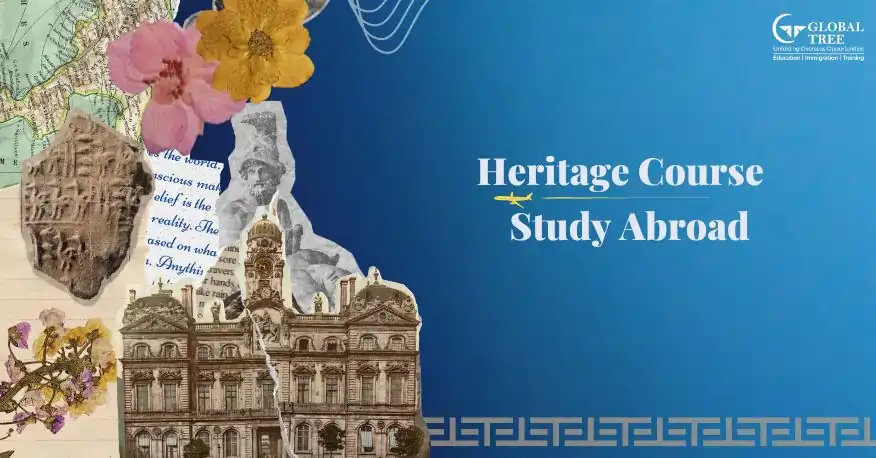All About Heritage Course to Study Abroad

Introduction
The field of heritage is interdisciplinary and strongly relies on viewpoints from fields like anthropology, archaeology, architecture, history, sociology, and psychology. The meaning of national symbols, rites, and rituals as well as heritage sites is examined in the curriculum of heritage studies at the local, national, regional, continental, and international levels. Heritage education significantly enhances a sense of place and civic responsibility. The heritage sector plays a critical role in maintaining a sense of place and shaping local identity. Historical sites increase our sentiments of rootedness and belonging while offering views into the past.
Who is eligible to study Heritage Course Abroad?
Studies of heritage provide you with a broad view of how past customs affect the present. Through these programs, you will acquire the information and skills necessary to comprehend cultural influences in contexts as diverse as communities, politics, literature, and art. You must be extremely driven, passionate about history, and fascinated by it. Choose the Best Heritage Courses & Colleges to Study Abroad. Studies in heritage may be the appropriate choice for you if you've always been fascinated by historical sites and artifacts.
How much does it cost to study Heritage Course Abroad?
You can choose to pursue a bachelor's or master's degree study in heritage studies. The course and speciality you select will determine the price and your available study alternatives. For instance, obtaining a bachelor's degree in the arts or sciences from a university and majoring in cultural heritage studies, history, indigenous studies, anthropology, or archaeology are prerequisites for heritage management. The bare minimum needed to enroll in these courses is a high school diploma. The majority of the time, prerequisite material or assumed proficiency in maths and English are needed. various colleges have various standards, and some provide lenient admission standards or options for outside study. Contact the institutions you are interested in for further details.
Students having a background in anthropology, archaeology, history, historic preservation, landscape architecture, or other relevant fields may pursue a master's degree in heritage studies. Students with prior experience in fieldwork, lab work, public interpretation, or museum work are also encouraged to apply. Additionally, it's crucial to get relevant expertise in the cultural sector, which includes museums, art galleries, historic buildings, and restoration. The most popular method is volunteering, however, there are also paid seasonal jobs available.
A master's degree Abroad in heritage management typically costs 19,350 per year in the US, providing an approximation of the price of heritage studies.
What is the Future Scope of Heritage Course Abroad?
With a background in heritage or related subjects, there are a wide variety of job options available. They can work as historians, archivists, curators, managers, museum directors, researchers, and conservators. For archivists, curators, and museum employees, a staggering 19% increase in employment prospects is predicted for this decade. This translates into an estimated 49,000 job opportunities for these occupations. Because of the general public's interest in science, art, history, and technology, museum technicians and conservators are expected to be in great demand.
Trending Career Options in Heritage Course Abroad
For those who want to pursue a profession in heritage, there are many different employment possibilities available.
Career as a Heritage/Museum Curator
Curators are experts in artefacts and objects with historical or cultural importance. They acquire, research, display, and document the artefacts in their possession. They typically have relevant academic credentials, and many job listings for curators specify that candidates must have postgraduate degrees. Assistant curators or researchers are frequently found in support positions at larger organisations. All types of graduates are qualified for opportunities, with a strong honours degree serving as the minimal academic need. Frequently, a postgraduate degree is necessary.
(Read more: Study abroad program in best universities)
Career as an Officer of Education (Heritage)
Officers in charge of education and outreach act as a bridge between the general public and creative organizations. One of their duties is to prepare and provide programs, activities, and materials for schools and other guests. Many will have experience working in education or the community, and job postings for teaching posts usually indicate that candidates with certification as teachers or with a related academic specialty are desirable.
Career as an Archivist
The management, processing, storage, and dissemination of information from an organization's archives are the responsibility of archivists. Research, collection and storage of textual resources, images, maps, architectural records, electronic materials, films and videos, sound recordings, and multimedia components are their main responsibilities.





